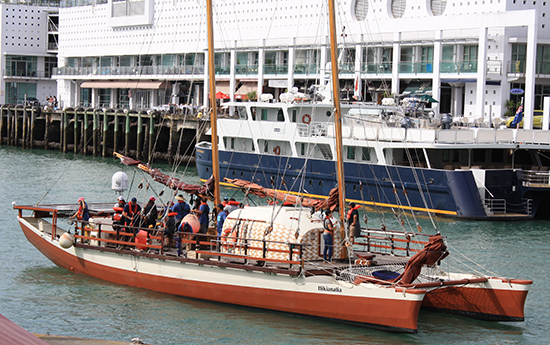Ariane Adam
AUCKLAND (AUT University/Pacific Media Watch): Support from the "critical mass" is needed to realise full indigenous language revitalisation, a cultural summit organised by AUT University’s Faculty of Māori and Indigenous Development/Te Ara Poutama and Te Ipukarea, AUT’s National Māori Language Institute has been told.
“We have a commitment to internationalise the right to language, and build greater proficiency in our youth,” says AUT professor Tania Ka'ai, director of Te Ipukarea.
“But we need people on the table to effect this positive change for our indigenous languages - we need the critical mass.
“There is enough research to show that te reo Māori and Hawai'ian are both still on the list of endangered languages in the world – they are both still at risk,” said Dr Ka’ai.
This theme was reiterated by a 30-strong delegation from Hawai’i, which included representatives from the University of Hawai’i, the Hawai’i State Department of Education, Kamehameha Schools, and the Polynesian Voyaging Society, while on the New Zealand leg of the Mālama Honua - Worldwide Voyage.
The president of the University of Hawai’i, David Lassner, reemphasised the importance of Dr Ka’ai’s call to action.
“Ten years ago, we were new to this concept of language revitalisation. In many ways, New Zealand was ahead of us when it came to keeping their indigenous language alive. In Hawai’i, we came pretty close to losing our language, and Hawaiian students were severely underrepresented and under-succeeding in University education.”
Hawai'ian commitment
“We have a commitment to Hawaiian people, to our Hawaiian language, and to enrol more Hawaiian students into University,” said Dr Lassner.
“Today, we have the opportunity – through a memorandum of understanding with AUT – to share in key learnings around language revival and Māori and Pacific advancement.”
AUT signed the MOU with the University of Hawai’i West O’ahu in 2010, and another MOU with thje University of Hawai’i Manoa in 2011. Both tertiary institutions have benefitted from student and staff exchanges, applied research, and immersion language programmes at both undergraduate and post-graduate level.
“Being in a global community like this enables us to share ideas and strategies on how we handle issues around language and cultural revitalisation,” said AUT te reo Māori language senior lecturer Dr Dean Mahuta.
Hawai’i State Department of Education Superintendent Kathryn Matayoshi said the cultural summit was a tremendous opportunity to hear about what is happening in New Zealand with respect to the Māori language and culture, and to learn more about what AUT was doing to help foster, sustain and support the movement.
“We have a similar set of issues around native Hawaiian culture and language, and learning what has happened here informs what we can do in Hawaii and the future,” said Matayoshi.
Polynesian canoes
The Hawai'ian delegation also included the Polynesian Voyaging Society, which provides crew on the Mālama Honua Worldwide Voyage of the Polynesian double-hulled sailing canoes, the Hōkūle’a and the Hikianalia.
The Society’s mission is to perpetuate the art and science of traditional Polynesian voyaging and the spirit of exploration through experiential programmes that inspire students and their communities to respect and care for themselves, and their natural and cultural environments.
As part of the Malama Honua Worldwide Voyage’s 40th anniversary celebrations, six students and staff members from Te Ara Poutama got the once-in-lifetime opportunity to experience ocean sailing on the Hikianalia in Auckland’s Waitemata Harbour.
Te Ara Poutama Master of Arts student Toi Williams said the sailing really anchored the importance of getting more youth to rethink and engage in experiences that reaffirm the value of culture, sustainability, leadership and education.
“To actually be on a vessel that sails traditionally, and that has as one of its key purposes, the aim of revitalising the knowledge of our ancestors, was an invaluable experience.”
Dr Linda Furuto, Associate Professor at the University of Hawai’i and crew member on the Malama Honua Worldwide Voyage, said the voyage was about navigating educational futures.
“We are one link in a chain that extends generations in both directions. We rely on the knowledge and wisdom of our ancestors, so that we can hope for, and envision, a better future for our children.”
Engaging students
Dr Shawn Kana’iaupuni, Director of the Public Education Support division at Kamehameha Schools, whose research centres around the impact of Hawaiian culture-based education on student outcomes, added that culture is the route to engaging students on their own learning journeys.
“You find that when students are exposed to culture-based education it has a direct impact on their socio-emotional development. It also has measurable impact on their math and reading achievement scores.”
“More than that, education is about cultural and linguistic freedom and allowing us to protect, and build greater vibrancy in, our indigenous peoples – education is critical,” says Dr Kana’iaupuni.
A video of the Hawai'ian delegation’s visit to AUT. Video: Video Media
PMW ID
9192
top



